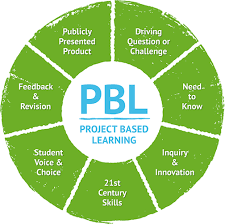|
As defined by the authors of a new study on the subject, Project-Based Learning “is a teaching and learning method engaging students in complex, real-world tasks that result in a product or presentation to an audience enabling them to acquire knowledge and life-enhancing skills.”
As such, some essential characteristics of Project-Based Learning (PBL) are:
Such characteristics of PBL are in line with what we know about student psychology, both in terms of motivation and cognitive processing. For that reason, PBL could very well be superior to traditional instruction, not only in promoting essential skills and attributes, but also in terms of knowledge acquisition and academic achievement. In the words of the authors: “Problem-based learning has grown in popularity because psychological research has shown that students’ learning may be limited in the context of traditional direct instruction, and there is a need for education to adapt to a changing world in which learners are encouraged to use what they know to explore, create, and construct solutions in the learning process. Students in traditional instruction classrooms, on the other hand, only use the lowest levels of cognitive processing to perform basic work like reading and memorizing. As a consequence, students’ knowledge of the subject matter may be fleeting and superficial; students cannot apply what they have learned, and are not stimulated to study on their own.” To test this hypothesis, two researchers conducted a meta-analysis on 30 journal articles published between 1998 and 2017. The studies involved over 12,500 students from 9 countries and showed a “medium to large” positive effect of PBL on academic performance. As a matter of fact, only 1 of the 30 studies found evidence of a negative influence of PBL. Interestingly, the positive effect was true regardless of educational stage: PBL benefitted all students, from primary school all the way to college. Likewise, the size of the group was not an important factor--although one-student projects were in part responsible for the few poor results observed. As far as subject areas are concerned, PBL proved effective across the board, but more so in humanities than in math and sciences. Importantly, classes devoting more than 2 hours per week to PBL had the best results--confirming that this alternative approach to education takes time, but is a good investment. Reference: Chen and Yang (2019), “Revisiting the effects of project-based learning on students’ academic achievement: A meta-analysis investigating moderators”, Educational Research Review, 60, pp, 263-274
0 Comments
Your comment will be posted after it is approved.
Leave a Reply. |
|
Proudly powered by Weebly

